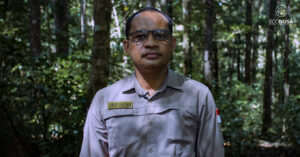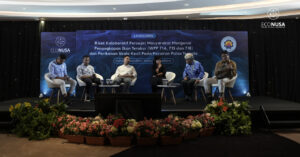
Laut Indonesia calls on all communities to join the Nusantara Sea Scout Community. Led directly by the main guide of Pandu Laut Nusantara Susi Pudjiastuti, “Facing the Sea” On Sunday, August 19, 2018, starting at 15.00 (WIT) 14.00 (WITA) 13.00 (WIB) and conducting a clean beach movement as an Indonesian movement caring for the sea, commemorating 73 Years of Indonesian Independence, in 73 main points from Aceh to Papua.
Together with 24 community groups, NGOs and sea lovers as well as public figures such as Kaka, Ridho SLANK and others, Pandu Laut Nusantara called for the “Sea is Not a Trash” and asked to immediately stop the use of disposable plastic in Indonesia. This was conveyed at the press conference held in Jakarta (13/08) as a guest speaker Susi Pudjiastuti, Minister of Maritime Affairs and Fisheries, Kaka Slank, Tiza Mafira, Director of the Plastic Bag Diet.
Susi said that the sea is the pride of the Indonesian people. It all started with a commitment in the Juanda declaration, but unfortunately there are currently many Indonesian sea threats that must be faced. For this reason, through this sea-facing movement, we are trying to unite all sea stakeholders, organizations and even individuals who have a love for the sea.
The sea is the future of the nation so we must all guard the sea, for the future of our children and grandchildren. On August 19, in the framework of 73 years of Indonesia, we invited 73 points throughout Indonesia to take a joint clean sea action. And as respect for the Indonesian sea which has provided many good things for Indonesia, then we take action “Facing the Sea”.
This is evidenced by the high pollution of plastic waste in the sea continues to be a worldwide concern. In this case Indonesia has a bad record. Jenna Jambeck’s research at the University of Georgia shows that Indonesia is among the 10 biggest contributors to marine plastic waste, with an estimated 0.48 – 1.29 million metric tons per year. This will certainly have an impact on public health, the decline in seafood and reduce the potential for tourism.
Tiza Mafira said the facts related to plastic waste. Waste in Indonesia reaches 64 million tons / year in which 3.2 million tons are plastic waste (source: BPS & INAPLAS). 10 billion pieces of plastic bags thrown into the environment per year = 85,000 tons of plastic bags (source: BPS & INAPLAS). As many as 32% of plastic waste used worldwide eventually pollutes the environment (source of the World Economic Forum 2016).
Plastic waste that enters the sea can break into small particles called microplastics with a size of 0.3 – 5 millimeters. Large plastic or microplastic is now consumed by marine animals and even has caused the death of marine animals.
Kaka Slank said that this activity was organized directly by the Nusantara Sea Guides Secretariat and the EcoNusa Foundation together with community groups independently throughout Indonesia. It is expected to become an effective educational arena for coastal communities of the disadvantages and dangers of throwing trash into the sea. We invite as much as possible to participate as a sea guide in the movement facing the sea and for information on this movement can be seen on the website www.pandulaut.org and social media @pandulaut (twitter), @bluesinblue.id (Instagram) and pandulaut.org (Facebook).




